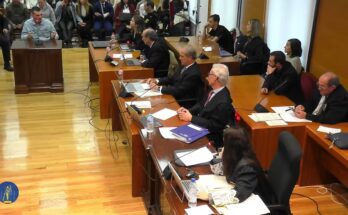The National Action Party, the main opposition force in Mexico, is in crisis due to the lack of members: in a country of 100 million voters only 319 thousand are active, a tenth of the more than three million that make up the register of Morena, the government party which is now working to reach 10 million members by 2027.
The thinning of the PAN’s militancy is an effect of its electoral defeats, but it is also the result of a purge carried out in 2012, the year in which it lost the presidency. At the time, leader Gustavo Madero launched a campaign to support the party’s more than 1.8 million members, which was snubbed by the vast majority and resulted in the loss of more than one and a half million PAN members.
The PAN, which prided itself on not being a mass party, today seeks to reverse these numbers and has placed ads in the streets and avenues of major Mexican cities and on social networks, inviting people to join the party through an app and a QR. “APPERURA, we can all run for office”, promises the propaganda with which the new party leadership, led by Jorge Romero, seeks to swell the ranks of the PAN.
“If we could grow to one million between now and 2027, it would be a very good number,” one of the party’s spokespersons confided to this newspaper. But everything must go through a reform of the statutes that speeds up the process of affiliation to the PAN, makes the requirements more flexible, incorporates electronic means and remote methods for registering and relaunches the figure of the “adherent militant”, a category canceled more than ten years ago after the purge of the registry.
In the best years of Vicente Fox and Felipe Calderón’s six-year term, the PAN had nearly 2 million adherents and 400,000 active members, who were those PAN members who fulfilled obligations such as paying dues and participating in promotional and indoctrination activities. One of the effects of the purge carried out between 2012 and 2013 was the emergence of the PAN census takers: a group of local leaders who decided on access to the party and who, with their lists of members, controlled conferences and assemblies, decided on municipal and state leadership and distributed candidacies to the positions elected by the people at will.
Jorge Romero himself was one of the main holders of the register. His rise as leader is explained by his control over the small list of PAN members in Mexico City. Today, however, the national leader promoted the statutory reform which, at least in his speech, aims to open the PAN to society, to swell its ranks again, to nominate better candidates – even if they are not active in the party – and to incorporate the survey method into its internal candidate selection processes, as Morena does. All this to the detriment of the control exercised by the census takers.
“In the National Action Party there will be Adherent Militancy and Active Militancy, depending on the degree of commitment to the party”, we read in the new article 10 of the PAN Statutes, the reform of which has already been approved by the Permanent Commission of the party and will have to be ratified in a National Assembly convened for the last days of November.
To be a militant member, the PAN will have basic requirements, such as being a Mexican citizen, having an honest lifestyle, not being affiliated with another party and committing to conforming and respecting the principles of National Action. Active members must also carry out party promotion activities, recruit other citizens, represent themselves at polling stations on election day, promote and defend the vote and participate in digital campaigns. Unlike adherents, active members will have the right to participate in elections to the party’s ruling bodies.
The return to two levels of militancy, however, was criticized by a PAN current led by former senator Adriana Dávila, who considers the idea of opening up to society by recognizing special rights and obligations to active members to be contradictory, instead of promoting a single militancy with full rights.
The associative crisis
In recent years, the decline of its militancy has brought the PAN to the brink of losing its registration as a political party, as Mexican legislation requires parties to maintain a minimum enrollment of 0.26% on electoral rolls, both at the national and state levels. An obligation that the National Electoral Institute must verify every three years. In 2023, the last time this requirement was verified, the PAN had 277,665 members, or 0.29% of the 94 million citizens registered at the time, thus slightly exceeding the minimum.
For the 2026 verification, the INE will use as a reference the electoral lists of the 2024 federal elections, which reached 98 million citizens, so the minimum to be reached will be 256,000 members. Currently, according to the National Register of Militants, the PAN barely meets the requirements, with its 319,635 militants (0.31% of the register).
Furthermore, there are eight states where there is a shortage of PAN members, which puts its registration as a local party at risk. The most critical case is Tabasco, a state of 1.8 million voters, where there are only 633 militants (0.03%). Other southern states where the PAN has lost members and votes include Chiapas, Guerrero, Oaxaca, Quintana Roo and Guerrero. Their militancy represents only 0.1% of the electoral lists.
But it also has problems in places like the State of Mexico, the most populated entity in the country with 13.2 million voters, where there are only 32,000 PAN members (0.25%). Or Coahuila, an entity that governs in alliance with the PRI, in which only 3,900 panists remain (0.16% of 2.4 million voters).
PAN leaders deny they are worried about losing registration. However, his entire campaign seems to focus on the militancy check that the INE will carry out in September 2026 and on the 2027 mid-term elections, in which the Chamber of Deputies, 17 governors, 31 local Congresses and thousands of municipal councils will be renewed.



